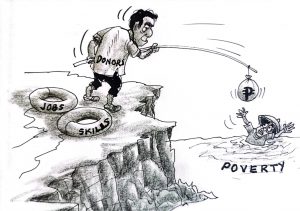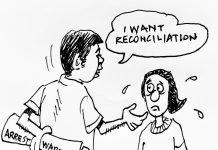The saying “Don’t give me a fish; teach me how and where to fish” perfectly encapsulates the deeper issues surrounding patronage, where people in authority dole out cash and goods to secure votes. This culture of dependency hinders true progress, as it offers short-term relief but no long-term solution. What the people need is empowerment through sustainable livelihood opportunities, not temporary handouts that only deepen their indebtedness to the benefactors who exploit their vulnerabilities.
At the heart of this issue is a system that thrives on keeping people dependent. By giving cash or necessities, politicians create a false sense of benevolence, masking the real problem: the lack of access to stable employment. Instead of offering real solutions, these handouts are transactional, designed to secure votes and political loyalty. This perpetuates a vicious cycle where citizens are kept in a state of need, unable to break free from poverty because their only lifeline is the very people exploiting their desperation.
The solution lies in shifting from temporary aid to long-term opportunities for growth. Jobs, skills training, and entrepreneurship programs can provide people with the tools they need to be self-sufficient. When families have reliable income sources, they can support their needs independently, which eliminates the need to rely on donors for survival. Moreover, empowering individuals through meaningful work fosters dignity and self-worth, creating citizens who are more engaged in civic life, rather than beholden to those in power.
In addition to creating jobs, there must be an emphasis on fairness in hiring and job creation. Transparent systems that prioritize qualifications and skills, rather than political allegiance, should be at the core of employment initiatives. This not only ensures that the most capable individuals are given opportunities, but it also reduces the culture of political dependency, ensuring a more merit-based society. Employment opportunities should be linked with economic policies that boost local industries, making job creation a key component of national development.
If we want to see real change, we must break the chains of dependency created by political patronage. Teaching people how to fish, figuratively speaking, means providing them with the resources and opportunities to secure their futures independently. To address this issue, the government must focus on sustainable job creation, accessible skills development, and transparent hiring practices. By doing so, we can create a more equitable society where citizens are empowered to provide for themselves and their families, free from the control of donors.




